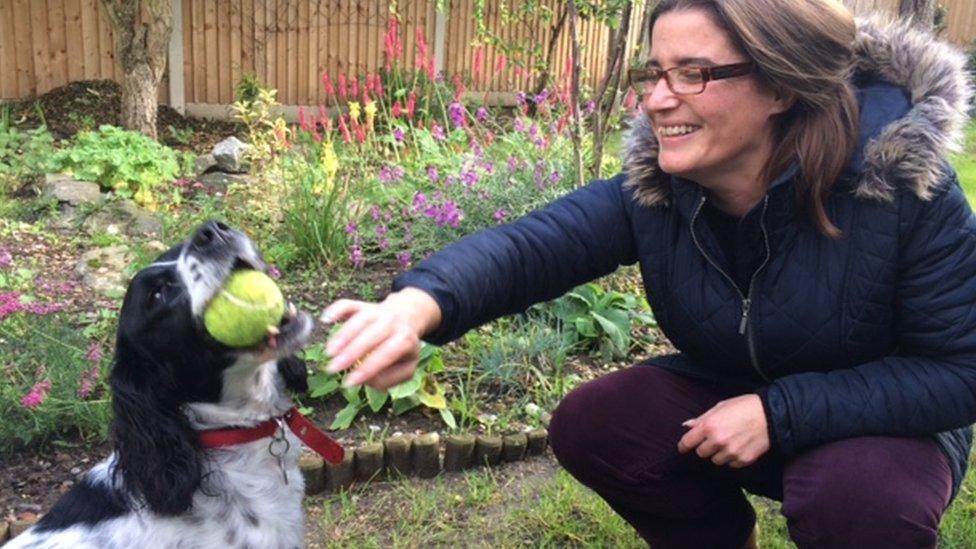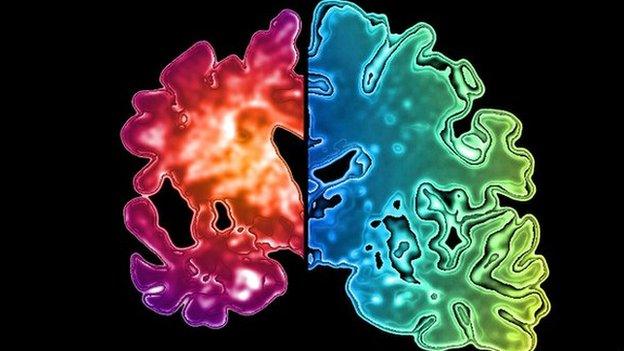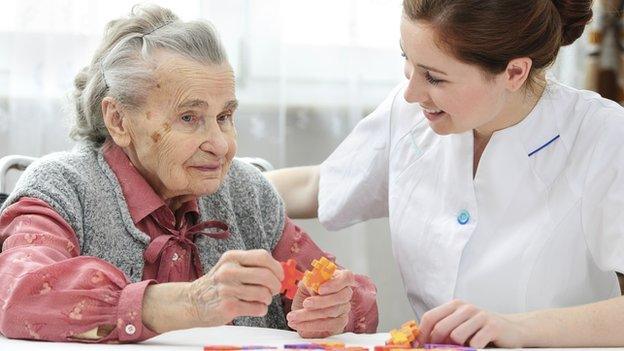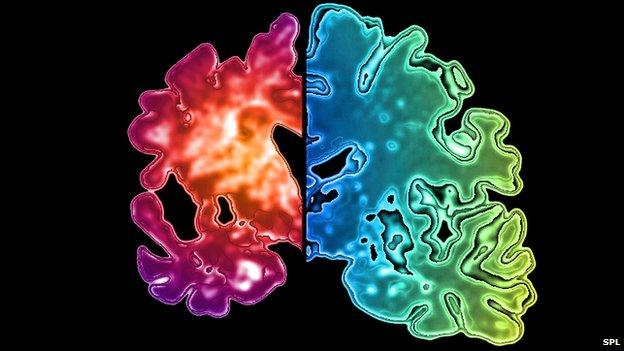First trial to stop Alzheimer's before symptoms emerge
- Published

Loss of tissue in a demented brain compared with a healthy one
Most research into dementia is about finding treatments for people who are already affected by symptoms.
But a trial is under way in London which aims to prevent Alzheimer's in people at high risk, before they show any physical signs of the disease.
These people have at least a 50-50 chance of carrying a rare genetic mutation which means they will develop the disease early in life - typically in their 30s or 40s.
Sophie Leggett, from Suffolk, saw her aunt and her mother develop Alzheimer's in their early 40s.
Now 39, she has chosen not to know whether she too has the rare genetic mutation that obliterated their lives and could soon take over hers.
She recalls seeing her mother decline, just as she was coping with her own baby baby girl, was hard to bear.
"I would look at her lying in a bed unable to communicate, unable to do anything at all for herself, and grieve for her - for the mum that I'd lost - but also for the fact that I felt like I was looking at my future," she says.
'Protect our children'
She is worried if she has the mutation, it could be passed on to her daughter, who is now in her teens.
"I can cope with the possibility that it could happen to me. And I have many a time made a deal with God saying I'll take it, give it to me, but don't let my daughter have it. I think we all want to protect our children. And I don't want her to feel the fear that I feel now for myself."

That is why she is taking part in a pioneering study which she feels could "change the future".
The Dominantly Inherited Alzheimer Network Trials Unit (DIAN-TU) is an international collaboration working with 200 people who - because of their genes - are at high risk of developing early onset Alzheimer's.
Dr Cath Mummery from University College Hospital in London is leading the UK branch of the study. She says this trial the first of its kind.
"They know that they may get Alzheimer's disease because they may have a mutation that causes it, but they don't have symptoms. So we're trying to prevent the onset of the disease which is very different."
The researchers are looking out for subtle signs of Alzheimer's that can start to appear years before physical symptoms emerge.
They are monitoring changes in the brain and spinal fluid and checking cognitive performance.
And they are testing two immunotherapy drugs to see if they can stop the disease.
'Really exciting'
Dr Mummery says if they are successful the benefits could extend well beyond this rare genetic group.
"Genetic Alzheimer's disease is very similar in the way that it affects people - apart from being younger - to sporadic Alzheimer's disease, the one you see in the general population," she explains.
"The really exciting bit after that is potentially we can extrapolate to that population and start to look at using this treatment for preventative measures for them."
Dr Mummery says she has found it humbling to work in the trial with people who have seen so much suffering in their families, and are ready to go through such extensive testing to help the research.
Sophie says that for a long time she struggled to deal with the spectre of Alzheimer's. Now though, she can discuss it freely. She has given advice to a new production at the Royal Court Theatre in London about familial Alzheimer's, called "Plaques and Tangles".

A scene from the Plaques and Tangles production at the Royal Court Theatre
The playwright, Nicola Wilson, says talking to Sophie was a moving experience.
"It brought me back to a quote I've got at the beginning of the play text by the physician William Osler, which is ask not what disease the person has, but rather what person the disease has."
In her mind's eye Sophie has no version of herself growing old. She assumes she will get Alzheimer's. She does not believe the trial will produce a treatment in time for her, but she wants to help future generations.
The Director of Research at Alzheimer's Research UK, Dr Simon Ridley, said the DIAN-TU study offered a unique opportunity to test new experimental drugs at the point when they were likely to have the biggest impact.
"The insight gained from the study has the potential to transform approaches to clinical trials and treatment development not only for families with rare genetic forms of Alzheimer's, but for everyone affected by the disease."
You can hear Adam's report on the PM Programme, BBC Radio 4 at 1700BST Thursday 22 October 2015.
- Published14 August 2015

- Published22 July 2015

- Published21 February 2015
